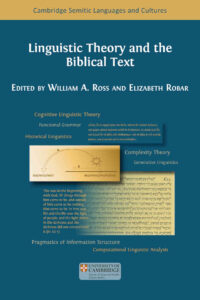ROSS, W. A.; ROBAR, E. (eds.) Linguistic Theory and the Biblical Text. Cambridge, UK: Open Book Publishers, 2023, 374 p. – ISBN 9781805111085.
Este volume, que está disponível para download gratuito, é o resultado da sessão de 2021 do grupo de pesquisa linguística e texto bíblico do Institute for Biblical Research, que aborda a história, relevância e perspectivas de amplos quadros teóricos linguísticos no campo dos estudos bíblicos.
Research, que aborda a história, relevância e perspectivas de amplos quadros teóricos linguísticos no campo dos estudos bíblicos.
Linguística Cognitiva, Gramática Funcional, linguística generativa, linguística histórica, teoria da complexidade e análise computacional recebem, cada um deles, um capítulo, descrevendo os principais compromissos teóricos de cada abordagem, seus principais conceitos e/ou métodos e suas importantes contribuições para o estudo contemporâneo do texto bíblico.
À medida que as disciplinas acadêmicas e as publicações acadêmicas proliferam e se tornam mais complexas em um contexto digital e global, a síntese de volumes como este assume uma nova importância tanto para especialistas quanto para generalistas. Esse é particularmente o caso em áreas interdisciplinares de pesquisa.
Este volume, portanto, pretende tornar a teoria linguística mais clara e mais acessível aos estudiosos da Bíblia em particular, não apenas através de uma explicação cuidadosa, mas também através de ilustrações específicas, recorrendo às antigas línguas hebraica, aramaica e grega dentro do corpus bíblico cristão.
As bibliografias fornecidas são estruturadas para os não especialistas, observando manuais, complementos e glossários, introduções gerais e textos fundamentais.
Ao fazê-lo, este volume apresenta não apenas um corte transversal totalmente atualizado da pesquisa linguística em estudos bíblicos, mas também um caminho explícito para o campo, ao mesmo tempo em que destaca caminhos importantes para investigação e colaboração contínuas.
 William A. Ross (PhD, Universidade de Cambridge, 2018) é professor associado de Antigo Testamento no Reformed Theological Seminary em Charlotte, Carolina do Norte.
William A. Ross (PhD, Universidade de Cambridge, 2018) é professor associado de Antigo Testamento no Reformed Theological Seminary em Charlotte, Carolina do Norte.
Elizabeth Robar (PhD, Universidade de Cambridge, 2013) é autora de The Verb and the Paragraph: A Cognitive Linguistic Approach (Brill, 2014), uma adaptação de sua tese de doutorado. Fundadora de Scriptura (antigo Cambridge Digital Bible Research). Sua pesquisa é de natureza filológica, linguística e exegética, com foco no sistema verbal do hebraico bíblico, sintaxe, mudança linguística e nas ramificações da pesquisa nessas áreas para interpretação exegética.
This volume is the result of the 2021 session of the Linguistics and the Biblical Text research group of the Institute for Biblical Research, which addresses the history, relevance, and prospects of broad theoretical linguistic frameworks in the field of biblical studies. Cognitive Linguistics, Functional Grammar, generative linguistics, historical linguistics, complexity theory, and computational analysis are each allotted a chapter, outlining the key theoretical commitments of each approach, their major concepts and/or methods, and their important contributions to contemporary study of the biblical text.As academic disciplines and academic publishing proliferate and become more complex in a digital and global context, synthesising volumes such as this one have taken on new importance for both specialists and generalists alike. That is particularly the case in interdisciplinary areas of research. This volume therefore sets out to make linguistic theory clearer and more accessible to biblical scholars in particular, not only by careful explanation but also by specific illustration, drawing upon ancient Hebrew, Aramaic, and Greek languages within the Christian biblical corpus. The volume assists the reader in distinguishing the separate assumptions and scope of study for the separate theories, recognising methods of approach that can be applied to any of the theories, and the role of an umbrella theory to enable all the others to fruitfully interact.
The bibliographies provided are structured for the non-specialist, noting handbooks, companions, and glossaries, general introductions, and foundational texts.
In so doing, this volume presents not only a fully up-to-date cross-section of linguistic research in biblical scholarship but also an explicit path into the field, while highlighting important avenues for continued investigation and collaboration.
William A. Ross (PhD, University of Cambridge, 2018) is associate professor of Old Testament at Reformed Theological Seminary in Charlotte, North Carolina. His publications include Postclassical Greek Prepositions and Conceptual Metaphor (edited with Steven E. Runge; De Gruyter, 2022) and Postclassical Greek and Septuagint Lexicography (SBL Press, 2022). His research focuses on the Septuagint, linguistics and lexicography, and the history of biblical philology.
Elizabeth Robar (PhD, University of Cambridge, 2013) is author of The Verb and the Paragraph: A Cognitive Linguistic Approach (Brill, 2014), an adaptation of her doctoral dissertation. She founded Cambridge Digital Bible Research, a charity to make biblical scholarship available, accessible, and useful to interpreters of the Bible. Her research is philological, linguistic, and exegetical in nature, focusing on the Biblical Hebrew verbal system, syntax, linguistic change, and the ramifications of research in these areas for exegetical interpretation.
